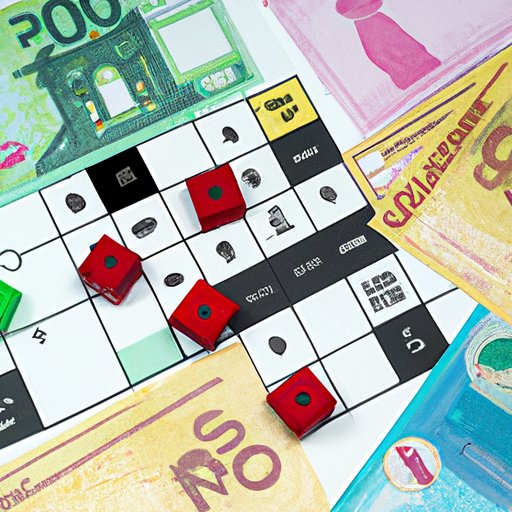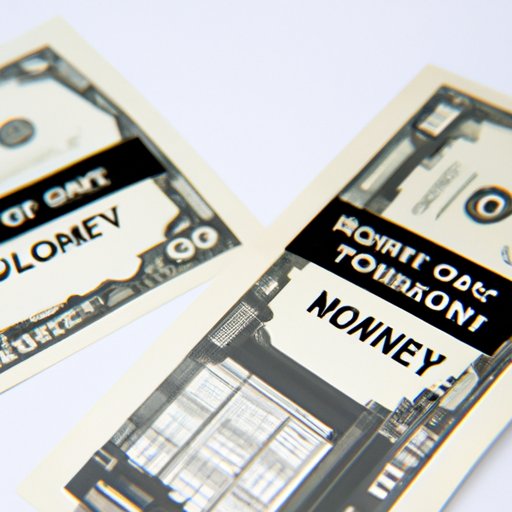
Introduction
At its core, Monopoly is a game of financial management and negotiation. Players compete to acquire properties and assets, negotiating with one another to buy, sell, and trade in order to build their own financial empires. And while the concept of Monopoly money may seem like a fun diversion from the real world, it’s actually a key component to the game’s strategy and economic theory. By understanding how much Monopoly money you start with and how to maximize its value, you’ll be well on your way to becoming a Monopoly champion.
The Ultimate Guide to Monopoly Money: How Much Do You Start With and How to Make the Most of It
So, how much Monopoly money do you start with? At the beginning of the game, each player is given:
- $1500 in total
- Two $500 bills
- Two $100 bills
- Two $50 bills
- Six $20 bills
- Five $10 bills
- Five $5 bills
- Five $1 bills
While this may seem like a substantial sum of money, it’s important to remember that in Monopoly, cash is king. Players must balance their cash reserves with their desire to purchase properties and assets, all while negotiating with their opponents to drive up the price of certain properties or secure advantageous trades.
So, how do you make the most of your starting cash? Here are a few key tips:
- Don’t blow your entire budget in the first few turns – it’s important to have some cash reserves on hand in case of unexpected expenses or opportunities
- Focus on acquiring properties that have the highest rent values, as these will generate the most income over time
- Consider strategic trading with other players to acquire properties that complement one another or that they may undervalue
- Always aim to collect a complete set of properties within a color group, as this will allow you to build houses and hotels, increasing rent and generating more income
- Be strategic when it comes to selling – while it may be tempting to sell a valuable property in order to raise cash quickly, it may ultimately hurt your overall earning potential
Counting Cash: A Breakdown of Monopoly Money and Its Value in the Classic Board Game
Understanding how much Monopoly money you start with is just the beginning – to truly master the game, you need to understand the different values associated with each denomination of Monopoly money.
In classic Monopoly, there are seven denominations of money:
- $1
- $5
- $10
- $20
- $50
- $100
- $500
Each of these denominations has a specific value in relation to the properties and assets in the game. For example, when you land on a property that you don’t own, you must pay the owner rent equal to the property’s listed value. Similarly, when you’re looking to purchase a property, the price is based on its listed value. And when you invest in houses or hotels, the cost is based on the property’s value and location on the board.
Understanding the value of Monopoly money in relation to the game’s assets is key to making smart financial decisions and securing your victory. Knowing when to hold onto your cash and when to invest in properties or assets is essential to a successful Monopoly strategy.
Monopoly Money 101: Understanding How Much You Get and Its Role in the Game
So, why is Monopoly money so important in the game? Essentially, Monopoly currency serves as both a resource and a barrier to entry. Players must use their cash reserves to purchase properties, invest in assets, and pay off debts. And because players can’t simply print more money, the cash reserves they start with become a crucial factor in determining their ability to grow their financial empire.
Of course, the value of Monopoly money doesn’t exist in a vacuum. In Monopoly, as in real life, the value of money is inextricably linked to the value of the properties and assets it represents. As players invest in more properties, build houses and hotels, and collect rent, the value of their holdings increases exponentially. The more capital players have on hand, the more opportunities they have to invest in valuable properties and assets, further expanding their financial power.
However, it’s important to note that Monopoly money isn’t just about raw financial power. The game is also about negotiation and strategy – players must learn to balance their cash reserves with their desire to acquire new properties, and to cultivate relationships with their opponents in order to strike advantageous deals and trades.
Maximizing Your Monopoly Money: Tips and Tricks for Winning the Game
So, how can you use your Monopoly money to best advantage in the game? Here are a few key tips and tricks:
- Focus on acquiring complete sets of properties, as this will allow you to start building houses and hotels, generating more income over time
- Don’t be afraid to negotiate with other players, even if it means giving up a valuable property. Your ultimate goal should be to maximize your earnings, and sometimes a strategic trade or sale can be the best way to do so.
- Try to keep a balance of cash on hand, even if it means passing on a valuable property or holding off on building houses or hotels
- Don’t neglect the importance of chance cards and community chest cards. These can provide valuable boosts to your income or help you avoid financial pitfalls
- Remember: the ultimate goal of the game is to amass the most wealth and property. Don’t be afraid to play aggressively if it means securing a victory.

The Surprising Truth About Monopoly Money: How It Reflects Real Life Financial Issues
While Monopoly money may seem like a lighthearted diversion from real-world financial issues, the game’s currency and economic principles actually have quite a bit in common with real-life financial situations. For example, the importance of cash reserves, the power of strategic investments, and the value of negotiation and compromise are all key components to managing wealth both in Monopoly and in the real world.
And while Monopoly may offer a simplified version of economic theory, it can also serve as a valuable tool for teaching important financial lessons. By understanding the importance of cash management, strategic investments, and negotiation skills, players can apply these same principles to real-world financial scenarios, helping them build wealth and achieve their financial goals.
Analyzing the Worth of Monopoly Money: Is It Really Just a Game or Does It Have Real Value?
One of the most interesting questions surrounding Monopoly money is whether or not it actually has any value outside of the game. After all, the currency is essentially just colored paper – it has no legal tender status and isn’t recognized by any government or financial institution.
However, there is an argument to be made that Monopoly money does have value, both culturally and socially. The game has become so iconic and beloved that the currency has taken on a life of its own, inspiring countless adaptations and spinoffs. And from a social perspective, the game’s currency has helped to shape the way we think about strategy, negotiation, and financial management.
From Board Game to Real Life: Lessons We Can Learn from Monopoly Money and Its Role in Economic Theory
So, what are some of the key economic principles that Monopoly money can teach us? Here are just a few:
- How to balance strategic investments with cash flow management in order to build wealth over time
- The importance of negotiation and compromise in achieving financial goals
- The value of diversifying your portfolio and investing in a range of different assets
- How to navigate a competitive marketplace and secure a competitive advantage
- Why having capital on hand is important in order to minimize risk and capitalize on opportunities
By incorporating these lessons into their own financial management strategies, players can maximize their earning potential and achieve greater financial success both in the game of Monopoly and in real life.
Conclusion
Understanding how much Monopoly money you start with and how to make the most of it is a crucial component to success in the game. From understanding the value of different denominations of currency to negotiating with other players to make strategic investments, there are countless ways to use Monopoly money wisely and effectively. And by applying the game’s economic principles to real-life financial scenarios, players can gain valuable insights into the world of wealth and investment.
So whether you’re a seasoned Monopoly veteran or a newcomer to the game, remember: in Monopoly, as in life, cash is king. By understanding how to make the most of your finances, you can come out on top and secure your place as a financial champion.




